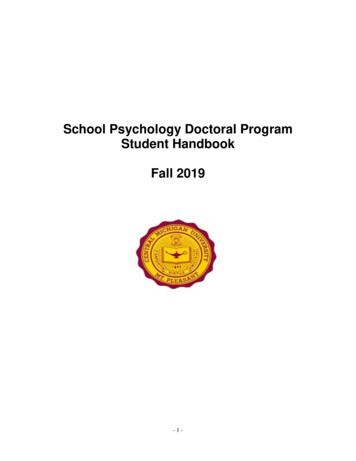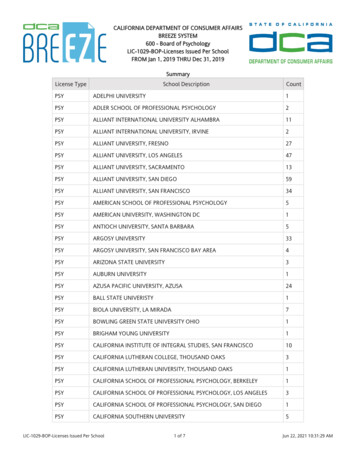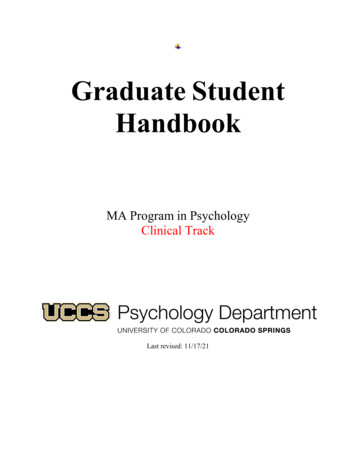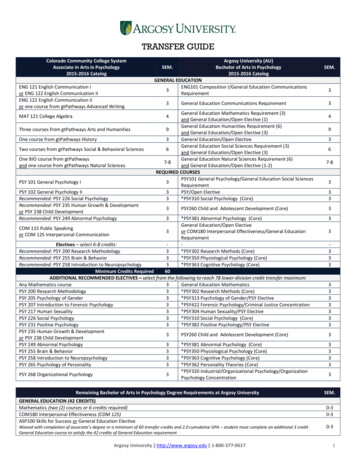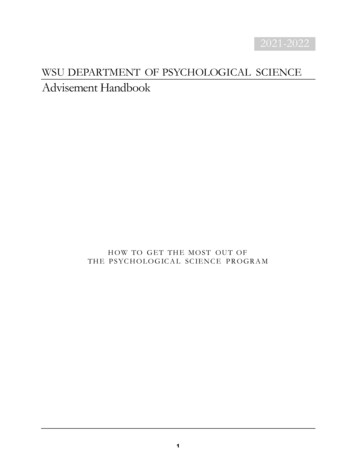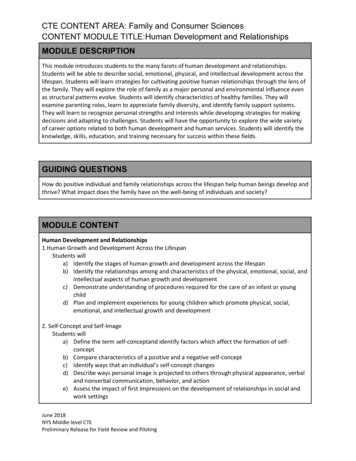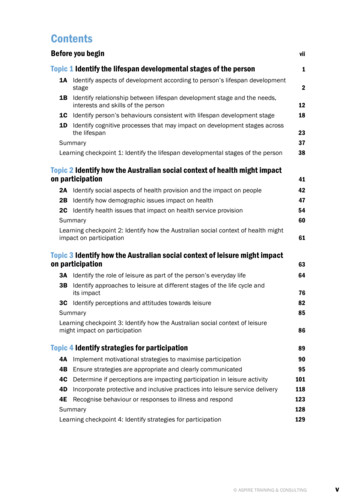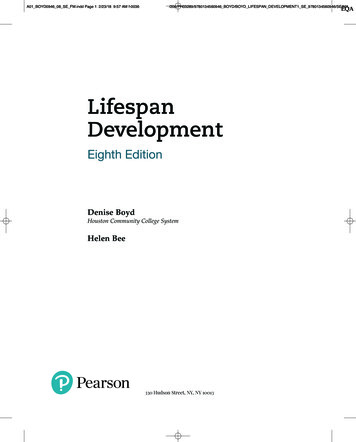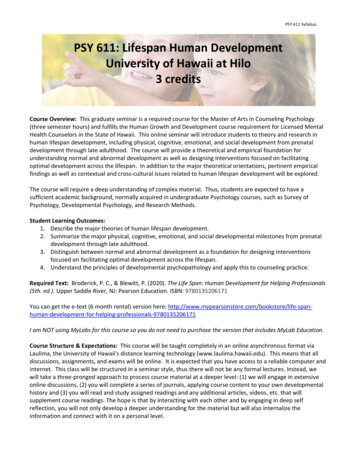
Transcription
PSY 611 SyllabusPSY 611: Lifespan Human DevelopmentUniversity of Hawaii at Hilo3 creditsCourse Overview: This graduate seminar is a required course for the Master of Arts in Counseling Psychology(three semester hours) and fulfills the Human Growth and Development course requirement for Licensed MentalHealth Counselors in the State of Hawaii. This online seminar will introduce students to theory and research inhuman lifespan development, including physical, cognitive, emotional, and social development from prenataldevelopment through late adulthood. The course will provide a theoretical and empirical foundation forunderstanding normal and abnormal development as well as designing interventions focused on facilitatingoptimal development across the lifespan. In addition to the major theoretical orientations, pertinent empiricalfindings as well as contextual and cross-cultural issues related to human lifespan development will be explored.The course will require a deep understanding of complex material. Thus, students are expected to have asufficient academic background, normally acquired in undergraduate Psychology courses, such as Survey ofPsychology, Developmental Psychology, and Research Methods.Student Learning Outcomes:1. Describe the major theories of human lifespan development.2. Summarize the major physical, cognitive, emotional, and social developmental milestones from prenataldevelopment through late adulthood.3. Distinguish between normal and abnormal development as a foundation for designing interventionsfocused on facilitating optimal development across the lifespan.4. Understand the principles of developmental psychopathology and apply this to counseling practice.Required Text: Broderick, P. C., & Blewitt, P. (2020). The Life Span: Human Development for Helping Professionals(5th. ed.). Upper Saddle River, NJ: Pearson Education. ISBN: 9780135206171You can get the e-text (6 month rental) version here: 206171I am NOT using MyLabs for this course so you do not need to purchase the version that includes MyLab Education.Course Structure & Expectations: This course will be taught completely in an online asynchronous format viaLaulima, the University of Hawaii's distance learning technology (www.laulima.hawaii.edu). This means that alldiscussions, assignments, and exams will be online. It is expected that you have access to a reliable computer andinternet. This class will be structured in a seminar style, thus there will not be any formal lectures. Instead, wewill take a three-pronged approach to process course material at a deeper level: (1) we will engage in extensiveonline discussions, (2) you will complete a series of journals, applying course content to your own developmentalhistory and (3) you will read and study assigned readings and any additional articles, videos, etc. that willsupplement course readings. The hope is that by interacting with each other and by engaging in deep selfreflection, you will not only develop a deeper understanding for the material but will also internalize theinformation and connect with it on a personal level.
PSY 611 SyllabusAssignment due dates are reflected below in the course schedule. You are responsible for submitting yourassignments, discussion posts, and exams on time. I do not accept late submissions, nor do I provide make-upexams unless there is an emergency preventing you from completing the assignment on time. If you will beunable to complete an assignment on time, please notify me as soon as possible and please includedocumentation of this emergency.Please be aware that the official means of communication at UHH is through your official UH email y.html). Email will be our official means of communication in this class.Please be sure to check your school email account regularly for email from me regarding the class. If you need toreach me, please send me an email (higac@hawaii.edu) and I will respond within 24 hours on weekdays.Evaluation and Grading:Discussions: In order to facilitate the application of developmental science to counseling practice and to deepenand expand your learning, you will participate in two online discussions about a case presented in your text. Atthe end of each chapter there is a case description and a series of questions. You will write a minimum 500-wordresponse, answering one or more of the questions. Successful responses will offer thoughts that are substantiveand insightful and will integrate relevant course material. You will also write a brief response to at least two ofyour classmates’ posts. These responses should be at least 100 words in length and should reflect back on thecontent presented in the text and supplemental materials. Posts are due at 11:59pm on the dates noted below.CategoryExcellent(27-30 points)CriteriaNeeds Improvement(18-22 points)Does not fully respond toSatisfactorily addressesthe question(s);question(s); at leastresponse lacks depth or500 wordsthoughtfulness; fewerthan 500 wordsDoes not fully identify orSatisfactorily identifiesdefine concepts andand/or definesterms from the text;concepts and terms;references are not allreferences to text ispresent or are notmostly accuratecompletely accurateSatisfactory(23-26 points)ThoroughnessandThoughtfulnessThoroughly andthoughtfully addressesquestion(s); at least 500wordsIdentifies andDefines RelatedCourseConcepts/TermsAccurately identifies anddefines course conceptsand/or terms; suppliesaccurate references totextIntegration ofCourse Materialinto DiscussionPostAccurately andthoroughly integratescontent from the text;provides accurateexamples and applicationof course material inresponse to discussionquestionsSatisfactorilyintegrates contentfrom the text;examples are mostlyaccurate andapplication of coursematerial is satisfactoryOrganization,clarity,grammar, andspellingClear and conciseresponse to the question;no grammatical orspelling errorsMostly organized andclear with fewgrammatical andspelling errorsResponses toClassmatesVery thorough responsesto classmates’ posts; atleast 100 wordsSatisfactory responsesto classmates’ posts; atleast 100 wordsDoes not fully integratecontent from the text oris not completelyaccurate in application ofmaterial in response todiscussion questionsSomewhatorganized/somewhatclear; moderate level ofgrammatical and spellingerrorsResponses to classmates’posts are lacking indepth and thoroughness;fewer than 100 wordsUnsatisfactory( 18 points)Poor response;significantly lacksthoughtfulness;significantly fewer than500 wordsCompletely lacking inthe identification ofcourse concepts orterms; text is notreferencedConveys little to noinformation from thetext when respondingto discussion questionsor is completelyinaccurateNot clear/difficult tounderstand; largenumber of grammaticaland spelling errorsResponses toclassmates’ posts arevery poor; significantlyfewer than 100 words
PSY 611 SyllabusJournals: As a way to integrate and apply your learning to your own developmental history, you will completetwo journal assignments. At the end of each chapter in your text there are a number of journal questions. Foreach journal entry, select one question to respond to. Each journal entry should be at least two pages in length(double-spaced, 12-point font, 1-inch margins, about 500 words). Successful journal entries will answer thequestion by integrating the assigned reading and considering how the material you learned applies to your owndevelopment. Journal entries are due at 11:55pm on the dates noted below in the schedule.CategoryCriteriaNeeds ImprovementDoes not fully respond toSatisfactorily addressesthe question; responsequestion; at least 500lacks depth orwordsthoughtfulness; fewer(37-44 pts)than 500 words(30-36 nessThoroughly andthoughtfully addressesquestion; at least 500words(45-50 pts)Accurate andAppropriateIntegration ofCourse Materialinto JournalAccurately identifies anddefines course conceptsand/or terms; accuratelyand thoroughly appliescontent from the text tojournal questions(67-75 pts)Satisfactorily identifiesand/or definesconcepts and terms;satisfactorily appliescontent from the textto journal questions(56-66 pts)Does not fully identify ordefine concepts andterms from the text;does not fullyintegrate/apply contentfrom text to journalquestions(55-45 pts)Organization,clarity,grammar, andspellingClear and conciseresponse to the question;no grammatical orspelling errors(22-25 pts)Mostly organized andclear with fewgrammatical andspelling errors(18-21 pts)Somewhatorganized/somewhatclear; moderate level ofgrammatical and spellingerrors(15-17 pts)UnsatisfactoryPoor response;significantly lacksthoughtfulness;significantly fewer than500 words( 30 pts)Completely lacking inthe identification ofcourse concepts orterms; conveys little tono information fromthe text whenresponding to journalquestions( 45 pts)Not clear/difficult tounderstand; largenumber of grammaticaland spelling errors( 15 pts)Exams: To assess your comprehension of course material (text and any supplemental information); you will taketwo online exams. While the exams will be "open book," they will be timed so be mindful of the time once youstart taking the exam (you cannot stop or “pause” once you've started). Further, while I encourage you to studywith your classmates, I expect that you will be taking these exams on your own (see notes below regardingacademic dishonesty). Exams include multiple choice questions and essays. Exams will only be open for a 24-hourperiod (opens 12am and closes 11:59pm). You are free to take it anytime during that 24-hour period. Also, besure to take your exams in Mozilla Firefox to avoid technological problems.AssignmentDiscussions (2 x 150pts)Journal Entries (2 x 150pts)Exams (2 x 200pts)TotalGradePointsA9501000A900949B 699F 600
PSY 611 SyllabusTechnical Requirements: This course is being taught using Laulima, the University of Hawai i online coursemanagement system. Listed below you will find the minimum requirements needed for a successful onlinecourse experience. Please make sure that you meet ALL of these minimum requirements before class begins.1. You will need basic computer and Internet skills (e.g., saving and accessing files, using email,uploading/downloading files, scrolling, using backward and forward buttons, updating virus protection,backing up files on a regular basis, etc.).2. You will need timely and frequent access to a Personal Computer (PC) or a Macintosh (Mac) system withsound capabilities. Be sure your system has sufficient resources to run Laulima and all software requiredfor your online course. In addition to your primary computer, campus facilities may also be used to accessonline courses. Please check with your campus lab facility for hours of operation. If this is your first onlinecourse, I highly recommend that you complete the UHH Online Learning Readiness Check to determinethat your computer system as well as your computer skills are online nereadiness.php).3. A reliable Internet Service Provider, or ISP is required. Broadband Cable or DSL are highly recommended.For those with dial-up connections, be sure you have at least a 56 Kbps modem. Students with dial-upconnections will experience delays when viewing lessons or downloading large files. DO NOT use dialup or wireless connections when taking exams. If you have a dial-up connection or use a wireless device,you must find a location with a wired broadband cable or DSL to take your exams. You can find these atyour local university campus lab facility, public library, or an internet cafe.4. Laulima was designed to be used in Mozilla Firefox. Please get in the habit of using Firefox when accessingour course site. You will experience problems taking exams if you try to use a browser other than Firefox(e.g., Internet Explorer). DO NOT use a browser other than Mozilla Firefox when taking exams. MozillaFirefox is available as a free download from http://www.mozilla.org/en-US/firefox/new/5. Documents posted on this course site will be in Portable Document Facility (PDF) format. To view thesedocuments, the Adobe Acrobat Reader is required. Individuals with visual impairment may benefit fromthe font enlargement and “Read Out Loud” features of Adobe Acrobat Reader. Acrobat Reader is availableas a free download from http://www.adobe.com/products/reader.htmlPromoting an Effective Learning Environment & Network Etiquette: To promote an effective learningenvironment for you, your classmates, and your instructor, please follow these network etiquette guidelines: Be sensitive to the fact that there will be students in the course with various cultural, linguistic, political,and religious backgrounds that may differ from your views. This makes for a rich learning environment.Please treat everyone with utmost respect. Be respectful of others’ views and opinions. Avoid “flaming” (publicly attacking or insulting) others as thiscan cause hurt feelings and negatively impact the learning environment. Use good sense when composing your responses in Discussion Forums. Swearing and profanity should beavoided. Also consider that slang can be misunderstood or misinterpreted. Don’t use all capital letters when composing your responses as it is regarded as impolite or aggressive.Promoting an Effective Learning Environment: To promote an effective teaching and learning environment foryou, your classmates, and your instructor, please (a) turn off cell-phones unless you have a very good reason forleaving them on, (b) do not surf the Internet, send text messages, or check your email/social media during class,and (c) do not carry on private conversations with classmates during lectures or group discussions.In addition, out of respect for your other classmates and your instructor, please arrive to class on-time. If you areunable to attend class for a documented emergency (e.g., hospital visit), please notify me as soon as possible andprovide documentation upon return to class. There will be no make-up presentations for unexcused absences.
PSY 611 SyllabusStudents having more than one unexcused absence will be dropped from the course and will receive either a W oran F for the course.Academic Integrity: Students are strongly encouraged to familiarize themselves with the Student Code ofConduct for UH Hilo, which can be found /student conduct.phpI expect you to behave with integrity and hold both yourself and your peers to the highest standards of ethicalbehavior. Academic dishonesty encompasses, but is not limited to: (1) plagiarism (i.e., copying anotherindividual’s words or ideas without appropriately citing the source); (2) turning in assignments that someone elsehas completed; (3) referring to notes or other written/electronic materials, collaborating with others, copyingsomeone else’s work, or providing answers to others in any fashion during an examination. Should I have reasonto suspect that academic dishonesty has occurred; I will conduct a thorough investigation and/or may refer thematter to the Dean’s Office for investigation. Possible sanctions should you be found responsible for academicdishonesty could include a failing grade for the course, suspension or even expulsion from the CounselingPsychology Program and/or University. Such consequences could negatively affect your candidacy forgraduate/professional programs and future jobs.Support for Students: Please click on this link to download a document describing additional supports available toUHH students: http://go.hawaii.edu/zAf
PSY 611 SyllabusPSY 611: Lifespan Human DevelopmentUniversity of Hawaii at HiloCourse ScheduleDue Dates for Discussions, Journals, and Exams are noted below. Journals are due at 11:55pm andDiscussions and Exams are due at 11:59pm on date dates indicated below. Make sure you arecompleting discussions and journals on the chapters noted in the table below.WeekTopicsChaptersAssignment (due 11:55pm)1Theories of DevelopmentEpigenesis and Prenatal DevelopmentThe Developing Brain and Stress and Adaptation System1&2Discussion #1 (Ch. 1)Discussion #1 Response (Ch. 1)2Early Childhood: Cognitive DevelopmentEarly Childhood: Social and Emotional DevelopmentEarly Childhood: Self and Socialization3, 4, 5Journal #1 (Ch. 5)3Middle Childhood: Cognitive DevelopmentMiddle Childhood: Self and Moral DevelopmentMiddle Childhood: Gender and Peer Relationships6, 7, 8EXAM #1 (Chapters 1-8)4Adolescence: Physical, Cognitive, Identity DevelopmentAdolescence: Social Development9 & 10Journal #2 (Ch. 10)5Young Adulthood: Physical and Cognitive DevelopmentYoung Adulthood: Socioemotional and Vocational DevelopmentMiddle Adulthood: Cognitive, Personality and Social Development6Middle Adulthood: Stress and Well-BeingLate Adulthood: Gains and Losses11, 12, 1314 & 15Discussion #2 (Ch. 12)Discussion #2 Response (Ch. 12)EXAM #2 (Chapters 9-15)
PSY 611 Syllabus PSY 611: Lifespan Human Development University of Hawaii at Hilo 3 credits Course Overview: This graduate seminar is a required course for the Master of Arts in Counseling Psychology (three semester hours) and fulfills the Human Growth and Development course requirement for Licensed Mental
